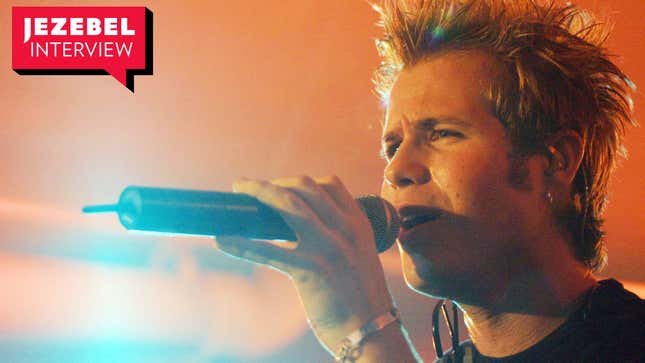O-Town's Ashley Parker Angel Recalls Making a Band in Real-Time
Entertainment

Diehard pop fans want nothing more than to feel close to their favorite artists. Twenty years ago this month, ABC and MTV fulfilled that dream with the creation of Making the Band. The reality show is probably best known for its second iteration when Diddy modernized the program with R&B groups like Danity Kane, but in 2000, it was all about boy bands. Lou Pearlman, a manager and con man fresh off successfully creating Backstreet Boys, *NSYNC, and LFO, decided the next step in the lucrative teen pop business was to give fans what they always wanted: day one access, so that they, too, could feel like they participated in the creation of their beloved groups. And it began with O-Town.
After hand-selecting members in a countrywide search, Pearlman assembled O-Town with Ashley Parker Angel, Erik-Michael Estrada, Trevor Penick, Jacob Underwood, and Dan Miller, who replaced Ikaika Kahoano. The success of the show’s debut season inspired the network to continue the series, documenting the entirety of the band’s existence, including their discovery of Pearlman’s financial crimes and rumors of his alleged sexual abuse. O-Town broke up after only three years (a short run, even for the most flash-in-the-pan boy bands) but left the world with two memorable singles—“Liquid Dreams,” and the ballad “All or Nothing”—and a shockingly prophetic show that would influence future reality TV programming.
To mark the 20th anniversary of Making the Band’s premiere, I called up O-Town’s frontman Ashley Parker Angel to talk about the show. Our conversation below is condensed and edited for clarity.
JEZEBEL: On Making the Band, O-Town became television stars before you were music stars, and becoming a music star was the entire point. That feels like a really modern way to pursue a pop career. I guess in 2020, it’s social media instead of TV.
ASHLEY PARKER ANGEL: Me and my acting manager, when the audition came through, we thought [Making the Band] was a scripted TV show. We thought it was going to be scripted the same way the Monkees was a scripted show about a band, and then the Monkees obviously used that TV show to launch a legitimate recording career. Having talked to Lou Pearlman once I actually made the band, I’d come to find out that the Monkees were his inspiration. He wanted to make the next iteration of that, and who better to do that than the guy who just created the two biggest superstar boy bands of the day? *NSYNC and Backstreet were just dominating.
At the time, we didn’t have tons of reality TV. The ones that did exist were like Real World or Road Rules. It wasn’t the most popular format. O-Town was essentially two worlds crossing: the world of reality TV shows and the world of boy bands. Those two worlds emerged into Making the Band as an experiment. Nobody knew if it would work. They would even refer to us as lab rats throughout the whole process. The first season was a full 22 episodes, and by the time 20 episodes had aired and it was a hit TV show, we still did not have a record deal.
Nobody knew if it would work. They would even refer to us as lab rats throughout the whole process.
Because of the success of the TV show, we were able to get the interest of Clive Davis. Cameras flew with us to New York. We signed the deal the week before the finale was going to air. They very quickly edited in the footage of us signing. If you look at what’s happened now with American Idol and The Voice, I think Making the Band really proved that that format could not only be a successful television series, but it can actually launch a legitimate recording group that could have legitimate hit songs on the radio.
And then other people caught wind. Simon Cowell ended up being in one of the early meetings we had with Clive Davis. Very quickly after that, he goes and does Pop Idol. We’d always heard on the record label side that Simon Cowell had been really inspired by what happened with Making the Band and O-Town—so he started Pop Idol, that becomes a huge success, and then, of course, Pop Idol becomes American Idol.
Pop music has a storied history with reality TV—like everything you were saying about American Idol and The Voice, but also One Direction 10 years later. They were made on The X-Factor UK, and they lost. The experiment with boy bands and reality TV has continued.
-

-

-

-

-

-

-

-

-

-

-

-

-

-

-

-

-

-

-

-

-

-

-

-

-

-

-

-

-

-

-

-

-

-

-

-

-

-

-

-








































